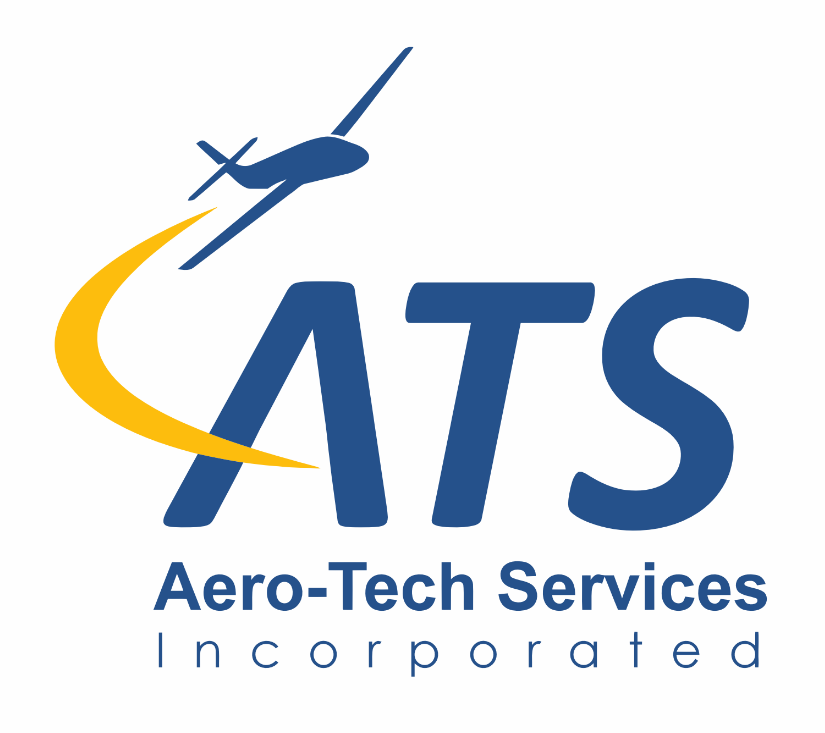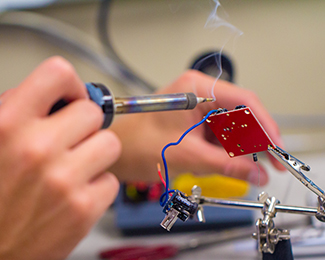Curriculum
EMU at Lancaster partners with Aero-Tech Services, Inc., an FAA-approved Part 141 Pilot School, to provide pilot training. Pilot training occurs at the Aero-Tech facility at Lancaster Airport in Lititz, PA.
The LOM degree with the aviation concentration is comprised of 120 credits.
Schedule of Course Offerings (subject to change)
-
Year One
-
Year Two
-
Year Three
-
Year Four
* Taught by Aero-Tech Services, Inc.
Year 1
Fall
AVIA 110: Becoming Aviators – An Introduction To Aeronautics
This course provides an introduction to, and survey of, the field of aeronautics.
It includes a study of the history and trends of aerospace activity, including airline
operations, military operations, and general aviation. Each student authors a paper
and oral presentation based on their research of a particular piloting vocation.
AVFO 120: Private Pilot Ground School
This ground training course provides the student with the aeronautical knowledge needed
to pass the FAA Private Pilot Knowledge Test, correctly answer subject matter questions
during the oral portion of the Private Pilot Practical Test, and operate safely as
a Private Pilot in the National Airspace System.
*AVFO 121: Private Pilot Flight
This flight training course provides the student with the experience and proficiency
necessary to meet the certification requirements of an FAA Private Pilot Certificate
with Airplane Single-Engine Land Category and Class ratings (ASEL). To complete this
course, students will pass the Final Progress Check and the FAA Private Pilot Oral/Practical
Test.
LOML 320: Leadership Development
The emphasis in this course is on the experiential nature of nontraditional education
and adult development theory. Students will be familiar with various theories and
instruments that will provide a cognitive basis for personal analysis and understanding.
The objective of this interdisciplinary module is personal discovery through examination
of issues in adulthood as studied in the fields of literature, wellness, and gender
studies.
WRIT 135: College Writing - Online
This first-year course develops academic reading, thinking, and writing skills in
various discourse communities while supporting students in their transition to EMU.
Includes a research project with particular attention to analysis and synthesis.
Spring
AVIA 120: Aircraft Systems
The objective of this course is to provide students with sufficient background knowledge
in aircraft systems and their operation, as required by various aviation occupations.
This course involves a comprehensive study of aircraft systems and components at the
technical level. Areas of study include: aircraft electrical systems; piston engine
ignition systems; turbine aircraft ignition systems and operations; aircraft hydraulic
and pneumatic systems; aircraft fuel systems; aircraft propellers and systems; aircraft
pressurization and environmental systems; ice and rain control systems; fire protection
systems.
AVFO 220: Instrument Ground School
This ground training course provides the student with the aeronautical knowledge needed
to pass the FAA Instrument Rating Knowledge Test, correctly answer subject matter
questions during the oral portion of the Instrument Rating Practical Test, and operate
safely as Instrument Rated Pilot in the National Airspace System.
*AVFO 221: Instrument Flight
This flight training course provides the student with the experience and proficiency
necessary to meet the certification requirements for adding an FAA Instrument Rating-Airplane
to an existing Private Pilot Certificate. To complete this course, students will pass
the Final Progress Check and the FAA Instrument Rating Oral/Practical Test.
LOML 355: Organizational Behavior
Students study the foundational theories and approaches to organization structure,
design, and culture. Primary emphasis is placed on understanding the organization
as an open system. Students will learn to utilize a systems approach in basic organizational
diagnosis. Contingency theory provides a theoretical framework for understanding the
impact of the business environment on organizational effectiveness, design, and change.
WRIT 160: Public Communication - Online
This course addresses the principles and practices of effective oral communication.
The course emphasizes rhetorical approaches for message design, presentation planning,
arrangement, and delivery that are useful across settings. Students will learn to
manage intercultural communication for effective business and workplace relations.
Students will receive feedback from groups and one-on-one.
Summer
AVIA 130: Meteorology
This course provides students with an understanding of aviation weather theory as
it applies to flight operations. As future aviation professionals, students will learn
how pilots, dispatchers, air traffic controllers and others access and utilize aviation
weather information. In addition, the available aviation products will be discussed
as applies to flight planning, en route weather decisions, and avoidance of weather
hazards. This course fulfills an EMU Core LOM-Aviation requirement.
LOML 380: Team Dynamics
This is a practical course on the skills and practice of team building and leadership.
Students will become familiar with team types, roles, composition and processes, and
assess personal team and leadership skills. Classes are structured around weekly simulations
that provide experience with teams and team leadership. A secondary emphasis is a
focus on communications and effective interpersonal relationships. Students will also
develop understanding of theories of motivation and conflict management and their
applications in team building.
Year 2
Fall
AVFO 320: Commercial Pilot Ground School
This ground training course provides advanced aeronautical knowledge in aerodynamics,
regulations, meteorology, aircraft systems, and airspace operations. This course provides
the student with the aeronautical knowledge needed to pass the FAA Commercial Pilot
Knowledge Test, correctly answer subject matter questions during the oral portion
of the Commercial Pilot Practical Test, and operate safely as a Commercial Pilot in
the National Airspace System.
*AVFO 321: Commercial Pilot Flight I
This flight training course is the first of three consecutive courses that provide
the student with the experience and proficiency necessary to meet the certification
requirements of an FAA Commercial Pilot Certificate with Airplane Single-Engine Land
Category and Class ratings (ASEL). Commercial Pilot flight maneuvers and complex and
technically advanced airplane (TAA) systems and operations will be introduced. To
complete this course, students will pass the Stage One Check.
LOML 420: Leadership, Theory and Practice I
During this course, students will examine the principles of management and leadership
which underlie the behavior of organizations. As in earlier courses, a systems approach
will be emphasized wherein the organization is viewed as a dynamic and changing system.
Working predominantly in groups, students examine motivational theory and its application
to individual and group functioning in work and home situations. Leadership styles
related to particular circumstances are analyzed.
LOML 430: Leadership, Theory and Practice II
Expanding upon the previous course, students will put their leadership theories to
practice as their knowledge, skills, and abilities are tested against real-world scenarios.
This course gives the student space to be introspective as they look back over the
months of education and determine how their beliefs and styles may have changed. Experiential
and application-based learning are utilized throughout this course to develop the
student's individual leadership style.
Spring
*AVFO 322: Commercial Pilot Flight II
This flight training course is the second of three consecutive courses that provide
the student with the experience and proficiency necessary to meet the certification
requirements of an FAA Commercial Pilot Certificate with Airplane Single-Engine Land
Category and Class ratings (ASEL). Commercial Pilot flight maneuvers and complex and
technically advanced airplane (TAA) systems and operations are reviewed, and cross-country
navigation is emphasized. To complete this course, students will pass the Stage Two
Check.
AVIA 220: Aerodynamics and Performance
This course provides a study of applied fluid mechanics and aircraft aerodynamic behavior.
It also reviews the mechanics and performance of turbine and reciprocating aircraft
engines. Exercises in aircraft performance problems are conducted, and a group research
project on environmental sustainability in aviation is accomplished.
LOML 370: Organizational Change
This course will explore the various theoretical and practical aspects of managing
organizational change within a business context. Students will learn to identify and
analyze key factors that influence organizational change, develop strategies for leading
and managing change initiatives, and assess the impact that change agents have on
individuals, teams, and organizations.
STAT 140: Elementary Statistics - Online
This general education course provides an introduction to descriptive and inferential
statistics. Topics include correlation, normal distributions, confidence intervals,
and hypothesis testing. Spreadsheets will be introduced and used throughout the course.
Summer
*AVFO 323: Commercial Pilot Flight III
This flight training course is the third of three consecutive courses that provide
the student with the experience and proficiency necessary to meet the certification
requirements of an FAA Commercial Pilot Certificate with Airplane Single-Engine Land
Category and Class ratings (ASEL). Commercial Pilot flight maneuvers, complex and
technically advanced airplane (TAA) systems and operations, and cross-country navigation
are reviewed. To complete this course, students will pass the Stage Three Check, the
End-of-Course Check, and the FAA Commercial Pilot Oral/Practical Test.
BISTL 380: Biblical Perspectives
This course reflects the commitment of Eastern Mennonite University as a Christian
liberal arts university. This is a commitment to nurture an appreciation for the rich
resources of the scriptures for creative personal faith and human life in the modern
world. It is designed to foster knowledge and understanding of the literature and
history of the Bible and the integration of faith, learning, and living.
Year 3
Fall
AVFO 420: Flight Instructor Ground School
This ground training course provides the student with the aeronautical knowledge needed
to pass the FAA Fundamentals of Instruction and Flight Instructor Knowledge Tests
and correctly answer subject matter questions during the oral portion of the Flight
Instructor Practical Test.
*AVFO 421: Flight Instructor Flight
This flight training course provides the student with the experience and proficiency
necessary to meet the certification requirements of the FAA Flight Instructor Certificate
- Airplane Single-Engine. To complete this course, students will pass the End-of-Course
Check and the FAA Flight Instructor Oral/Practical Test.
SRSML 460: Business Ethics
In this course, the student formulates a philosophy of life, providing the base for
such concerns as ethics in business, accountability in government, respect for human
rights, and a responsible lifestyle in our contemporary world. With a focus on three
basic ethical perspectives - virtue theory, deontological theory, and utilitarianism,
ethical theories and personal values are examined through readings, analysis of the
workplace, and classroom discussion.
CCSCL 450: Intercultural Perspectives
This course focuses on the development of global awareness, faith, and management
as it relates to cultural understanding. Students will be challenged to look beyond
their own culture and understand social systems and institutions from the perspective
of people in another culture. Experiential learning will take place as students participate
in an off-campus, cultural experience in a culture that is different from the students’
majority orientation.
Spring
AVIA 320: Aviation Safety
This course is a balanced overview of aviation safety and promotes a value system
of regulatory compliance and the nurture of an organizational safety culture driven
by ethical leadership. The course includes risk management, accident case studies,
principles of accident investigation, the nature of accident error chains, voluntary
safety programs, human factors, and an introduction to the Safety Management System
(SMS). It imparts practical skills that are immediately useful to the aviation student,
as well as a foundation for future safety leadership in aviation organizations.
AVFO 340: Multiengine/Professional Operations
Course to include ground and flight instruction required to add FAA Airplane – Multiengine
Land Rating to a Commercial Pilot Certificate. Will include subjects related to the
exercise of the Commercial Pilot Certificate in professional settings, including line
operations related to security, aircraft servicing, and passenger safety, and Pilot-in-Command
aircraft maintenance and airworthiness responsibilities.
LOML 410: HR: Optimizing Workforce Development
This course demonstrates the effective merging of the practice and perspectives of
management and the Human Resources professional. Students will understand that human
resources management recognizes the value of the employee as a key contributor. In
so doing it provides a management challenge necessitating the personal as well as
professional development of the employee. It goes far beyond the quest for increased
productivity resultant from capital improvements by including management techniques
designed to obtain maximal contributions from the members of the organization. The
primary objective of this course is to present the principles and practices of human
resource management, and to highlight the optimization of workforce development strategies.
Social/Behavioral Science (Gen Ed) - Online
Summer
AVIA 330: Aviation Law and Regulatory Compliance
This course examines the evolution of federal civil aviation regulations in the United
States. Students will examine the past and present problems prompting regulation of
the industry, the resultant safety, legislation, airport development, funding legislation
and international aviation legislation. Students will study Title 14 of the Code of
Federal Regulations (14 CFR), previously called the Federal Aviation Regulations (FAR);
the application of 14 CFR Parts 1, 61, 91, 141, NTSB Part 830 and various other 14
CFR Parts. A discussion of the history of aviation regulations, the rulemaking process,
letters of interpretation and enforcement will be included.
LOML 405: Organizational Research
This course guides the student in understanding the research process and becoming
a critical consumer of research. Organizational research concepts are examined in
both qualitative and quantitative methodologies. Students critically read and critique
organizational research.
Year 4
Fall
AVIA 400: Commerical Aviation Advanced Subjects
This course prepares students to pursue a career in commercial aviation, to include
positions that are outside of 14 CFR Part 121 but which require an Air Transport Pilot
Certificate. Students will research vocations and organizations and will select a
particular organization that conducts types of operations in which they are interested
in serving. Students will complete a paper on that organization deriving from research
about their organizational history, past and current key persons, financial structure,
and nature and location of their operations. Students will receive assistance in applying
for the internships in which they will engage in AVIA 430 - Aviation Internship, in
the spring semester of their senior year.
AVIA 401: Air Transport Advanced Subjects
This course is a survey of 14 CFR Part 121 passenger and cargo airline operations.
Students will study topics related to the following functional areas: flight operations,
dispatch, customer service, cargo carriage, aircraft maintenance, and cabin safety.
Students will visit the operations and maintenance facilities of a 14 CFR Part 121
air carrier organization and will complete a research project and paper based on a
Part 121 operation. Students will receive an orientation in a full-motion jet simulator.
Students will receive assistance in applying for the internships in which they will
engage in AVIA 430 - Aviation Internship, in the Spring Semester of their senior year.
LOML 440: Global Trends in Economic Justice
This course examines global economic trends, theories of justice, and issues in economic
justice. A variety of written materials, historical literature, and contemporary culture
are examined for their perspectives on economic justice and fairness. Local, national,
and international perspectives on economic development and justice are studied. Students
will develop a deepened and more nuanced perspective on issues of poverty and justice.
LOML 461: Application of Research Project for Aviators
Students combine their research and practical implementation of leadership and organizational
theories and concepts in this capstone project. The project examines an area of the
student’s aviation occupation or avocation. The student’s project will be written
and presented orally to the instructor and cohort learning group.
Creative Arts (Gen Ed) - Online
Spring
AVIA 430: Aviation Internship
Aviation concentrators will complete a supervised internship with an established aviation
organization. Internships run during a full semester and may be completed in fall,
spring, or summer. Each internship must be approved by the AVIA 430 course instructor.
For successful completion of this course, the student will: compile a resume and cover
letter prior to seeking an internship; seek and acquire an internship position with
the approval of the AVIA 430 course instructor; submit the Aviation Internship Proposal
Form; be under the supervision of a professional in the aerospace industry; work a
minimum of 252 hours in an approved operation; remain responsible for completing all
assignments and for routinely communicating with the AVIA 430 course instructor during
the internship experience.
Natural Science (Gen Ed) - Online
Literature/History (Gen Ed) - Online
* Taught by Aero-Tech Services, Inc.
Note: All courses are three credits except AVIA 430: Aviation Internship, which is
six credits.






